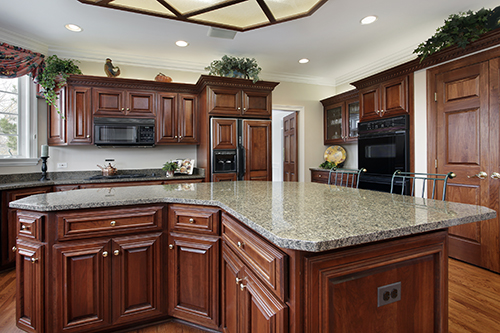If your kitchen has granite countertops or if you are thinking of having granite counters installed at your home or other property, you are likely wondering whether they need to be sealed. Furthermore, you might be wondering how often this sealing must be performed and how it is best implemented. Indeed, granite countertops require sealing at specific times. Here is a quick look at everything you need to know about sealing granite counters to keep them looking beautiful.
Don’t be Intimidated by the Upkeep of Granite Countertops

There is a common misconception that granite countertops require an abundance of upkeep. Though granite requires more maintenance compared to quartz and other options, this upkeep won’t chew up much time nor will it require significant effort. Granite is comparably porous, yet no two granite counters are exactly the same.
You can conduct a basic water test to determine if your granite countertops require sealing. Here’s how to do it. Pour a small amount of water on your granite counter. Do not pour more than a quarter cup of water on the counter. Make a mental note of the point in time when you put the water on the counter. Gauge the length of time it takes for the granite counter to absorb the water. You can tell that the water has been absorbed when the granite darkens in color.
If the counter immediately absorbs the water, you should add a couple sealer layers each year and also do your best to wipe away spills as soon as they occur. If it takes the granite countertop around five minutes to absorb the water, you will still need several layers of sealer, yet they can be added every three to five years. Be sure to perform the water test prior to applying the sealer once again to ensure the sealer is truly necessary.
If it takes 10 minutes for your granite countertop to absorb the water, a single sealer layer will be required. However, you probably won’t have to reapply the sealer again until several years pass. If it takes half an hour for the granite counter to absorb the water or if it the counter simply does not absorb it, there is no need to add sealer.
Why Sealing Granite Counters is so Important
The reapplication of sealant to your granite counters at the intervals noted above ensures the granite does not end up stained or damaged in another manner. After all, the last thing you want is to mar your beautiful granite counter surface. Those who cook in their kitchen at a high frequency and use their granite counters on a daily basis will have to reseal them that much more frequently.
Advancements in nanotechnologies and polymers have enhanced the strength of sealers across posterity, providing stain protection that lasts upwards of several years or even longer. In general, granite counters will benefit from a resealing every three years or so.
Does Granite Color Matter in Terms of Resealing?
In short, yes, the color does matter. The frequency of resealing is partially determined by the granite’s color. If you have dark granite such as Indian Coffee Brown, Black Pearl or Brown, it is likely to be less dense than granite of a lighter hue. The elevated density results in the granite being less porous and more prone to staining.
Choose Your Sealant Carefully
No two sealants are exactly the same. Some sealants last longer than others. When in doubt, opt for a sealant with advanced chemical technology. Sealants featuring this technology are that much more capable of generating a lasting bond on the granite.
